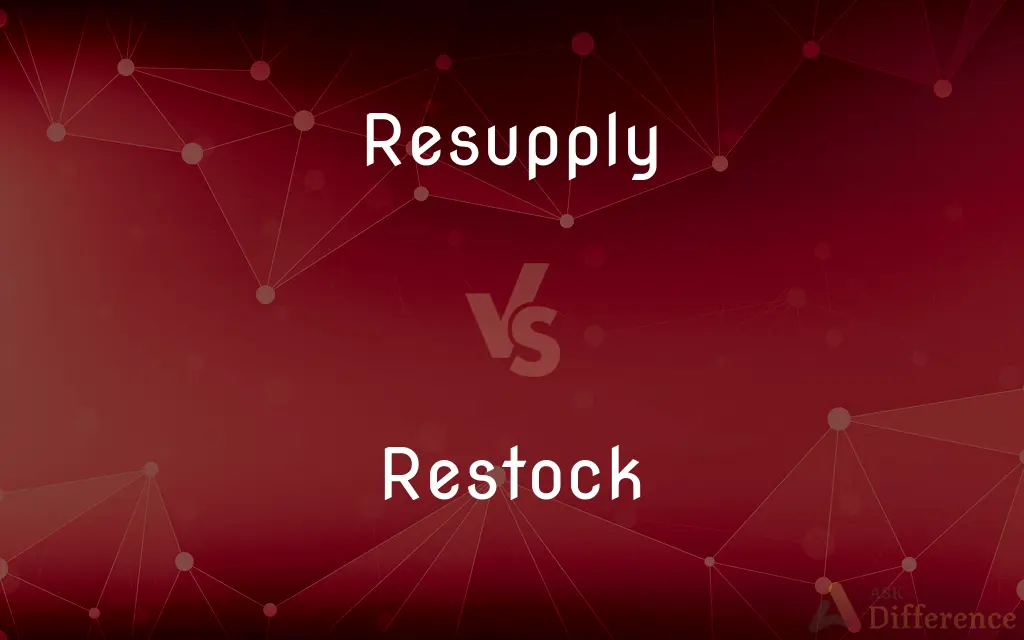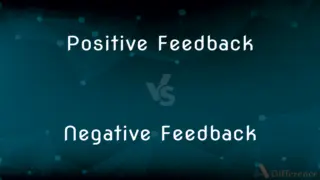Resupply vs. Restock — What's the Difference?
Edited by Tayyaba Rehman — By Fiza Rafique — Published on November 20, 2023
"Resupply" means to provide additional supplies, especially in situations of depletion. "Restock" refers to replenishing stock, especially in retail or storage. Both relate to adding supplies, but their contexts and usage differ.

Difference Between Resupply and Restock
Table of Contents
ADVERTISEMENT
Key Differences
"Resupply" implies providing supplies again or additionally, often after they've been used up or are running low. The term often resonates in contexts like military operations, camping trips, or long expeditions where the resources get exhausted and there's a need for a fresh supply. For example, in a military mission, troops might need to resupply their ammunition and food rations periodically.
"Restock", on the other hand, is a term commonly used in retail and storage settings. It pertains to replenishing goods on shelves or in storage after they have been sold or taken out. For instance, a bookstore might restock its shelves with bestsellers that have sold out, ensuring that customers always have access to popular titles.
While "Resupply" often carries a sense of urgency or necessity, given that it's usually about essential supplies needed to continue an activity or mission, "Restock" is more routine, revolving around the regular management of inventory. It's about maintaining a certain level of goods available for purchase or use.
In their essence, both terms, "Resupply" and "Restock," deal with adding more to what's been depleted. However, "Resupply" leans more toward the idea of survival, continuation, or maintaining momentum. In contrast, "Restock" leans towards business, inventory management, and ensuring availability.
Grammatically, both terms can be used as verbs. But while "Restock" can also commonly function as a noun, representing the act of replenishing stock, "Resupply" is less frequently used in such a manner. In most contexts, "Resupply" serves as a verb, indicating the action of supplying again.
ADVERTISEMENT
Comparison Chart
Context
Urgency, continuation, military or expeditions
Retail, inventory management, business
Tone
Necessity
Routine
Common Usage
As a verb
Both as a verb and a noun
Implication
Providing necessary supplies again
Replenishing inventory or goods
Associated Domains
Military, expeditions, survival
Retail, storage, business
Compare with Definitions
Resupply
To furnish with additional or fresh supplies.
The expedition team set up points to resupply water and food.
Restock
To fill up again with goods or supplies.
The store needs to restock its shelves every Monday.
Resupply
To provide new supplies, especially after depletion.
The army had to resupply its troops on the front lines.
Restock
To replace sold-out items in a store or warehouse.
We restock the bestsellers to ensure constant availability.
Resupply
To make available again what has been used up.
After the long journey, they had to resupply their resources.
Restock
To renew or refill a storage area with items.
It's time to restock the pantry with fresh produce.
Resupply
To refill after extensive use or consumption.
The long trip necessitated frequent stops to resupply.
Restock
To replenish inventory or items that have been used or sold.
After the holiday sales, we had to quickly restock.
Resupply
To equip with necessary items again.
We need to resupply the medical kits after the camp.
Restock
To provide a fresh supply of goods.
After the clearance sale, the shop had to restock entirely.
Resupply
To provide with fresh supplies, as of weapons and ammunition.
Restock
To furnish new stock for; stock again.
Resupply
(transitive) To supply again.
Restock
To stock again; to resupply with a stock of goods.
Resupply
(intransitive) To stock up on supplies again.
Restock
The act of stocking again.
We will carry out a restock of the vending machine every Friday.
Resupply
(uncountable) The act of supplying again.
Restock
Stock again;
He restocked his land with pheasants
Resupply
A package of materials used to replenish supplies.
Resupply
To supply again.
Common Curiosities
Is "Restock" a routine activity for businesses?
Yes, businesses regularly restock to maintain inventory levels.
Can "Resupply" imply a continuation of some activity?
Yes, "Resupply" often means providing supplies to continue an activity or mission.
Does "Restock" always mean completely refilling inventory?
Not necessarily. "Restock" can mean adding to or completely refilling inventory.
Is "Restock" both a noun and a verb?
Yes, "Restock" can refer to the act of replenishing (noun) or the action itself (verb).
Is "Resupply" often used in emergency situations?
Yes, "Resupply" often implies a need for essential supplies, sometimes urgently.
Does "Restock" mostly relate to retail contexts?
Primarily, yes. "Restock" is commonly used in retail and inventory contexts.
Can "Resupply" be about any type of supply?
Generally, yes. "Resupply" can be about any supplies, from food to ammunition.
Are "Resupply" and "Restock" interchangeable?
Not always, as they have nuanced differences in context and usage.
Can "Resupply" have a sense of urgency?
Often, yes. "Resupply" can imply an urgent need for supplies.
Can "Resupply" be used as a noun?
Less commonly, but it can refer to the action or process of supplying again.
Does "Restock" imply a sold-out condition?
Not always. "Restock" can be a regular addition or after items are sold out.
Which term leans more towards survival or continuation?
"Resupply" often leans towards survival, continuation, or maintaining momentum.
Share Your Discovery

Previous Comparison
Consultant Employee vs. Full Time Employee
Next Comparison
Positive Feedback vs. Negative FeedbackAuthor Spotlight
Written by
Fiza RafiqueFiza Rafique is a skilled content writer at AskDifference.com, where she meticulously refines and enhances written pieces. Drawing from her vast editorial expertise, Fiza ensures clarity, accuracy, and precision in every article. Passionate about language, she continually seeks to elevate the quality of content for readers worldwide.
Edited by
Tayyaba RehmanTayyaba Rehman is a distinguished writer, currently serving as a primary contributor to askdifference.com. As a researcher in semantics and etymology, Tayyaba's passion for the complexity of languages and their distinctions has found a perfect home on the platform. Tayyaba delves into the intricacies of language, distinguishing between commonly confused words and phrases, thereby providing clarity for readers worldwide.












































